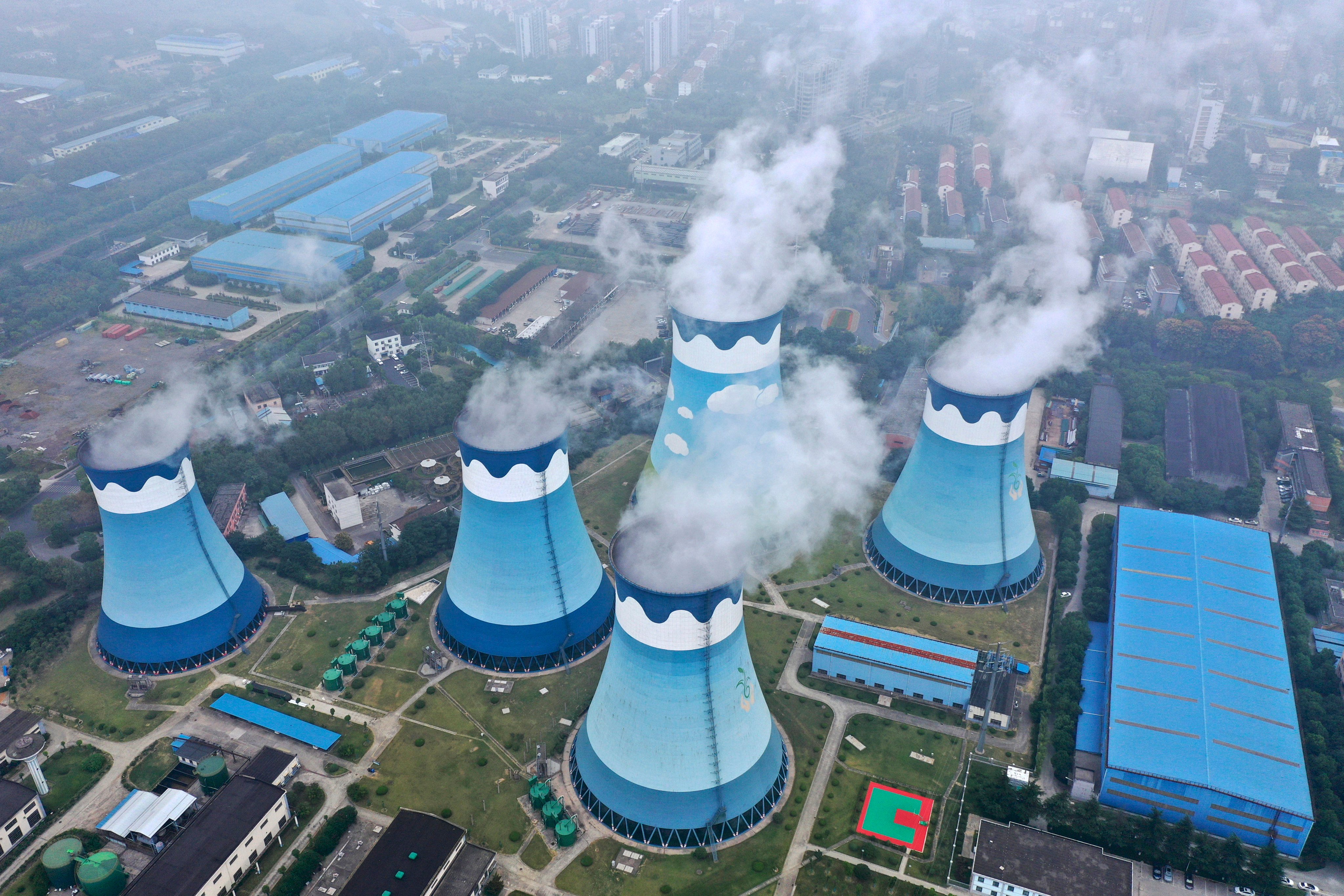Canada's Growing Role In China's Energy Security Strategy

Table of Contents
Canada's Abundant Energy Resources: A Strategic Asset for China
Canada possesses a wealth of energy resources crucial to China's economic engine. This makes Canada a key player in China's quest for energy security, offering a diverse portfolio that extends beyond traditional fossil fuels.
Canadian Oil and Gas Exports to China
Canada is a significant exporter of oil and natural gas to China, a trend expected to continue and potentially increase.
- Export Figures: While precise figures fluctuate yearly, Canadian oil and gas exports to China have shown steady growth over the past decade. Specific numbers require referencing the latest reports from Statistics Canada and the National Energy Board.
- Key Pipelines: The Trans Mountain pipeline expansion project, for instance, is significantly increasing the capacity for transporting Canadian crude oil to the West Coast, facilitating exports to Asian markets, including China. Other pipeline projects and infrastructure investments play a crucial role in supporting energy trade.
- Future Expansion Plans: Ongoing exploration and development of oil sands and shale gas reserves in Canada continue to enhance export potential to China and other international markets. However, logistical challenges remain.
- Transportation and Logistics: The distance between Canadian production sites and Chinese refineries, along with navigating international shipping lanes and port capacities, present logistical hurdles that need to be addressed to optimize energy trade.
Canadian Uranium and its Significance for China's Nuclear Power
Canada is a globally recognized leader in uranium production, a critical component of China's expanding nuclear power program.
- Volume of Uranium Exports: Canada consistently ranks as a major supplier of uranium to China, providing a significant portion of the raw material needed to fuel its nuclear reactors. Precise export volumes are subject to confidentiality agreements and market fluctuations.
- Safety Regulations and International Standards: Canada adheres to strict safety regulations and international standards regarding uranium mining and export, ensuring responsible and secure supply chains.
- Future Contracts and Market Competition: Competition exists from other uranium-producing countries, yet Canada maintains its strong position due to its established reputation for reliable supply and stringent safety protocols. Future contracts will hinge on continued market demand and geopolitical stability.
Renewable Energy Potential: Hydropower and Other Clean Energy Sources
Beyond fossil fuels, Canada's vast renewable energy resources offer a compelling pathway to support China's burgeoning clean energy demands.
- Hydropower Projects: Canada's abundant hydropower resources represent a significant opportunity for clean energy export, potentially meeting a portion of China's increasing electricity needs.
- Technological Advancements and Export Opportunities: Canadian innovation in areas like solar, wind, and geothermal energy presents export opportunities to China, fostering collaboration in clean technology development.
- Investment and Collaboration: Joint ventures and partnerships between Canadian and Chinese companies can drive further investment and collaboration in the renewable energy sector, promoting sustainable development on both sides.
Geopolitical Implications and Bilateral Trade Relations
The energy relationship between Canada and China is intertwined with broader geopolitical considerations and the complex dynamics of bilateral trade.
Navigating Trade Tensions and Diversification Strategies
Canada-China trade relations have experienced periods of both cooperation and tension, impacting energy collaboration.
- Trade Agreements and Barriers: Existing trade agreements and any potential barriers significantly influence the flow of energy resources between both countries.
- China's Diversification Strategy: China's pursuit of diversified energy supply sources naturally impacts its reliance on any single partner, including Canada. This necessitates a strategic approach by Canada to maintain its competitive advantage.
Investment and Infrastructure Development
Chinese investment in Canadian energy projects is contributing to infrastructure development, creating jobs and stimulating economic growth.
- Key Investments and Infrastructure Projects: Examples of specific Chinese investments in Canadian energy infrastructure will showcase the scope and impact of this collaboration.
- Benefits and Challenges of Foreign Investment: While foreign investment can be mutually beneficial, challenges related to regulatory frameworks, national security concerns, and ensuring fair market access need careful consideration.
Environmental Considerations and Sustainable Development
Sustainable development and environmental protection are paramount considerations in shaping future energy cooperation between Canada and China.
- Canada's Environmental Regulations: Canada's robust environmental regulations and commitment to responsible resource management are crucial in fostering trust and ensuring environmentally sustainable energy trade.
- China's Commitment to Reducing Carbon Emissions: China's stated goals for reducing carbon emissions and transitioning towards a greener economy are important factors shaping its energy choices. Cooperation in green technologies is a promising avenue for mutual benefit.
- Opportunities for Collaboration in Green Technologies: Joint research and development efforts in green technologies and sustainable energy solutions will be a cornerstone of a long-term, mutually beneficial partnership.
Conclusion: The Future of Canada's Energy Partnership with China
Canada's role in China's energy security strategy is multifaceted and continuously evolving. Its abundant energy resources, ranging from traditional fossil fuels to a growing portfolio of renewable sources, position Canada as a key player in meeting China's energy needs. However, navigating complex geopolitical dynamics and ensuring sustainable development are crucial for fostering a long-term and mutually beneficial partnership. The future of this relationship hinges on transparent trade relations, responsible resource management, and a commitment to innovation in green technologies. To learn more about Canada's vital contribution to China's energy security, delve into reports from Natural Resources Canada, the Canadian Energy Regulator, and relevant industry publications. Understanding Canada's Growing Role in China's Energy Security Strategy is critical for comprehending the future of global energy markets.

Featured Posts
-
 Navigating The Posthaste Canadian Households And The Aftermath Of Trumps Tariffs
Apr 23, 2025
Navigating The Posthaste Canadian Households And The Aftermath Of Trumps Tariffs
Apr 23, 2025 -
 Broadcoms V Mware Deal A 1 050 Price Increase According To At And T
Apr 23, 2025
Broadcoms V Mware Deal A 1 050 Price Increase According To At And T
Apr 23, 2025 -
 Mlb Umpiring Controversy Tigers Manager Hinch Challenges Plate Call Decision
Apr 23, 2025
Mlb Umpiring Controversy Tigers Manager Hinch Challenges Plate Call Decision
Apr 23, 2025 -
 Lane Thomas Strong Start With Cleveland Guardians In Spring Training
Apr 23, 2025
Lane Thomas Strong Start With Cleveland Guardians In Spring Training
Apr 23, 2025 -
 Netflix Weathers Big Tech Storm Is It A Safe Harbor In Uncertain Times
Apr 23, 2025
Netflix Weathers Big Tech Storm Is It A Safe Harbor In Uncertain Times
Apr 23, 2025
Latest Posts
-
 The Jeffrey Epstein Client List Pam Bondis Role And Allegations
May 10, 2025
The Jeffrey Epstein Client List Pam Bondis Role And Allegations
May 10, 2025 -
 Pam Bondis Statement On Possessing The Epstein Client List Fact Or Fiction
May 10, 2025
Pam Bondis Statement On Possessing The Epstein Client List Fact Or Fiction
May 10, 2025 -
 The Epstein Case Pam Bondis Claim Regarding The Client List
May 10, 2025
The Epstein Case Pam Bondis Claim Regarding The Client List
May 10, 2025 -
 Did Ag Pam Bondi Obtain The Jeffrey Epstein Client List A Deeper Look
May 10, 2025
Did Ag Pam Bondi Obtain The Jeffrey Epstein Client List A Deeper Look
May 10, 2025 -
 Pam Bondis Alleged Possession Of The Epstein Client List An Investigation
May 10, 2025
Pam Bondis Alleged Possession Of The Epstein Client List An Investigation
May 10, 2025
